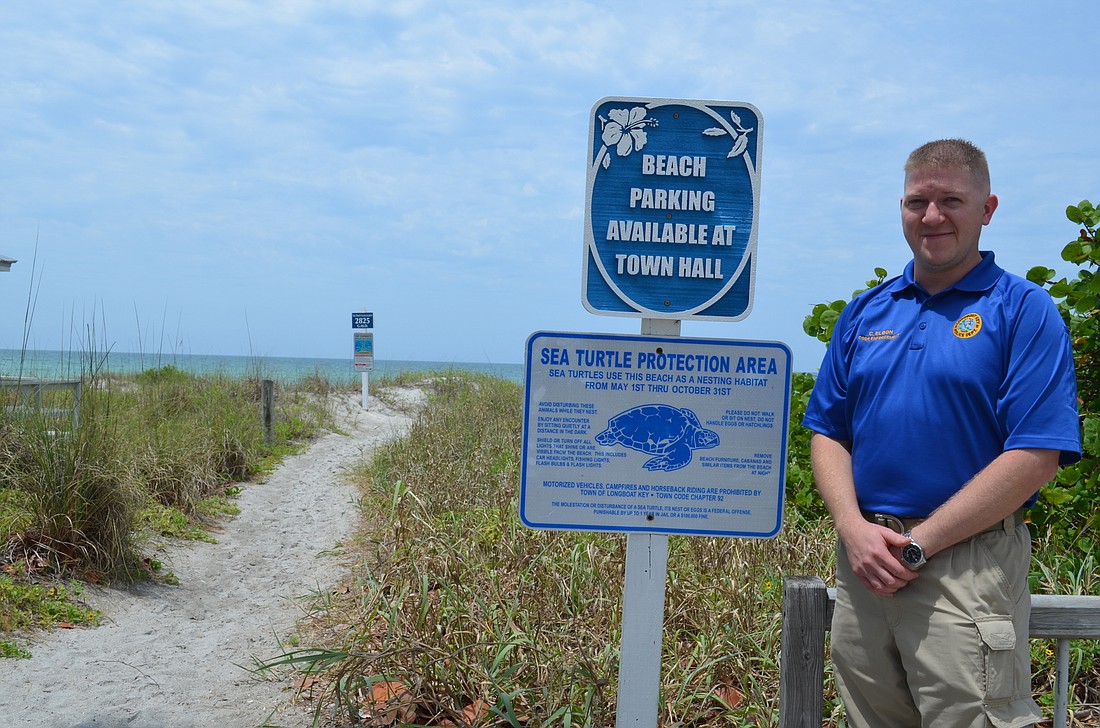- April 8, 2025
-
-
Loading

Loading

When Code Enforcement Officer Chris Elbon began documenting sea turtle lighting violations so Longboat Key could obtain permits to dredge New Pass in May, he ran into pushback from property owners.
“They complained that there wasn’t a new ordinance,” Elbon said. “So there was nothing I could do as the code enforcement officer.”
Less than two months later, he’s working on more than 200 flyers and pamphlets to distribute to property owners.
On July 5, after three workshops and more than four hours of discussion, commissioners agreed to strengthen the island’s sea turtle rules.
The new ordinance eliminated a requirement that limited code enforcement to searching for violations on a moonlit night. It also increases the types of lighting the town can enforce from nine to 13 varieties, including interior lighting. The ordinance also makes it a violation to leave furniture and recreational items close to the shoreline from 11 p.m. to 5 a.m.
Artificial lighting can confuse sea turtle hatchlings and nesting females, causing them to crawl away from the Gulf of Mexico. There have been 690 such disorientations since June 2, Elbon said.
Residents in existing buildings have until next nesting season to make improvements to block interior or exterior lighting that’s visible from the beach.
For now, Elbon will target the two-mile area around the former Colony Beach & Tennis Resort, where a beach project recently commenced, with educational materials and visits to potential violators.
As of July 12, Mote Marine Laboratory and Aquarium volunteers and staff have relocated about 138 nests from that area to the south end of the island during the town’s $10 million mid-Key beach renourishment, according to Town Manager Dave Bullock.
“So that is a pretty intense area,” Bullock said.
The new regulations could make it easier for the town to obtain permits to renourish its beaches during nesting season. But the town has to prove that the revised ordinance is working.
“I think we have to demonstrate that we have a program that justifies beach renourishment during turtle season,” Bullock said.
Since the new ordinance passed, Elbon and Bullock haven’t heard much backlash against the new rules.
“If they know turtles are hatching every night, and your lights are affecting them, most people will want to fix it,” Bullock said.
Commissioner Phill Younger, who was one of the leading voices against some of the specific language in the new ordinance, said he hasn’t heard any feedback from residents.
“But, I was clear in the meetings where I stood on parts of the ordinance,” Younger said.
Loren Lysen, general manager at Beachplace of Longboat Key, said the ordinance is too new to generate any comments from residents. And most of the condo’s occupants are renters during the offseason.
“Our only concerns might be with the residents with regard to individual lighting facing the beach,” Lysen said. “But they’re really good about it after one or two notifications.”
This month, Town Attorney Maggie Mooney-Portale will review the wording of the tags that Elbon will affix to chairs, coolers and other beach furniture that has been left in the path of hatchlings or nesting sea turtles. Town staff is currently exploring whether the Longboat Key Police Department has space to store items in violation for up to 90 days or until claimed by its owner.
“It has to be some place secure,” said Elbon, who will begin tagging after Mooney-Portale approves the wording. “We don’t want someone to just walk away with someone else’s beach chair or cooler.”